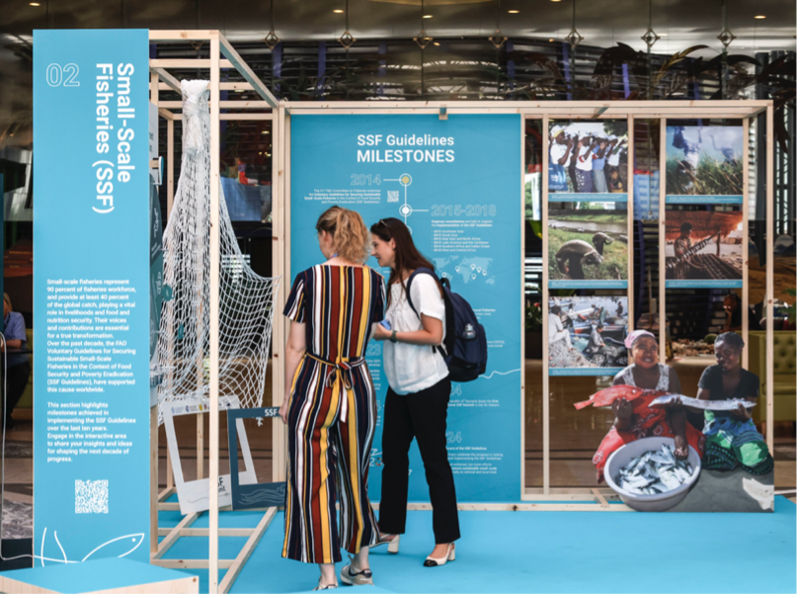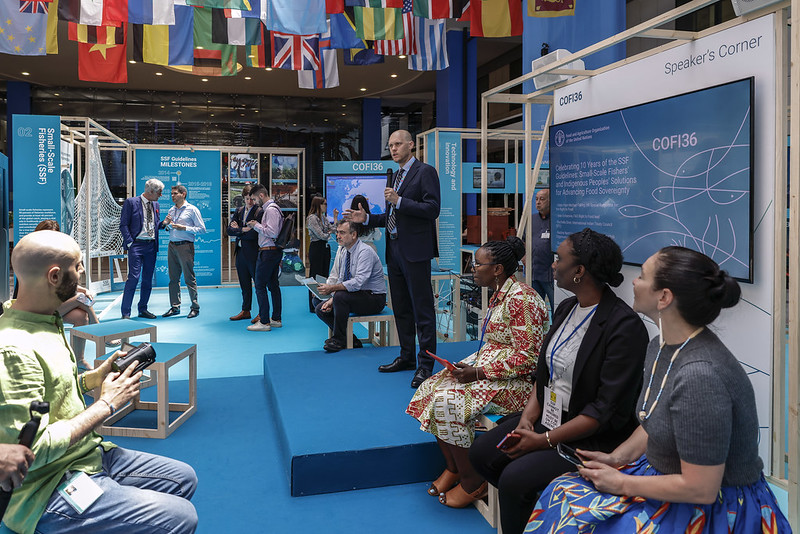This article summarizes how small-scale fisheries and the Voluntary Guidelines for Securing Sustainable Small-Scale Fisheries in the Context of Food Security and Poverty Eradication (SSF Guidelines) have been celebrated, mentioned and presented throughout the Committee of Fisheries’ (COFI) sessions, side events and speaker’s corner.
Final report of COFI 36
Small-scale fisheries came up strongly in the statements of countries and observers throughout the week under the various agenda items discussed by the Committee and the final report approved on the last day of the committee includes specific references and recommendation in relation to small-scale fisheries and the SSF Guidelines:
Opening of the session
§6 - “The Committee welcomed the COFI High-Level Special Event on the 10th anniversary of the Voluntary Guidelines for Securing Sustainable Small-Scale Fisheries (SSF) in the Context of Food Security and Poverty Eradication, commended the implementation of the Voluntary Guidelines, and encouraged Members to continue implementing them.”
§7 – “The Committee appreciated the information shared on the 2nd SSF Summit, held prior to COFI 36, and encouraged FAO to continue holding SSF Summits prior to future COFI meetings.”
State of world fisheries and aquaculture and progress in the implementation of the Code of Conduct for Responsible Fisheries and related instruments
10. The Committee:
§10, a) - commended FAO for the 2024 edition of the State of World Fisheries and Aquaculture (SOFIA) publication including its emphasis on Blue Transformation4 to efficiently support Members, partners, and key stakeholders particularly small-scale fishers to achieve the 2030 Agenda for Sustainable Development;
§10, f) – “while noting variability between and within regions, expressed concern for the continuously degrading accumulated trends at the global level in the status of marine fish stocks, due to unsustainable practices, challenges from illegal, unreported and unregulated fishing, overcapacity and overfishing, climate change, loss of biodiversity and aquatic ecosystems degradation and welcomed the progress made in some regions, emphasizing the need to improve fisheries management measures acknowledging the management challenges concerning fisheries undertaken by small-scale fishers, particularly multi-stock fisheries, including through strengthened collaboration with and within Regional Fisheries Bodies (RFBs), as appropriate;”
§10, j) – “stressed the crucial contribution of small-scale and artisanal fishers, fish farmers and fish workers, and the need to promote gender equity, and reduce inequalities in the fisheries and aquaculture sector; recognized the importance of the SSF Summit as a platform for small-scale fisheries actors to exchange views and express needs to secure sustainable small-scale fisheries; and continued to encourage the Summit be held every two years prior to COFI;”
§10, p) “reiterated FAO’s role in monitoring and reporting on the SDG 14 indicators under its custodianship and commended FAO’s role in supporting Members’ work to track their progress on SDG 14 indicators and encouraged FAO to continue its integrated assessment of SDGs under its custodianship and those SDG targets that directly impact small-scale fisheries;”
Decisions and recommendations of the nineteenth session of the COFI Sub-Committee on Fish Trade, 11-15 September 2023
12. The Committee:
§12, d) - stressed the importance of enhancing the efficiency and transparency of fisheries value chains and requested that FAO continue to provide technical expertise and support in this area, particularly regarding food loss and waste, market access, compliance with import requirements, traceability, and the specific needs of SSF;
Decisions and recommendations of the first session of the COFI Sub-Committee on Fisheries Management, 15-18 January 2024
13. The Committee:
§13, d) – “noted the need to address small-scale fisheries management issues in the COFI:FM in support of the CCRF and of the implementation of the Voluntary Guidelines for Securing Sustainable Small-Scale Fisheries in the Context of Food Security and Poverty Eradication;”
§13 g) - encouraged the Sub-Committee to further discuss the issue of distant water fishing vessels that are not subject to sufficient management and control, potentially having negative impacts on SSF especially in developing countries;
The role of fisheries and aquaculture in food security and nutrition
16. The Committee:
§16, b) “underscored the role of aquatic foods to reduce malnutrition in vulnerable populations, including Internally Displaced Persons (IDPs) and refugees, among others through school feeding, nutrition and education programmes, and the important contributions of small-scale fisheries, as well as the diversity of gastronomic heritage, in this regard;”
§16, h) - encouraged FAO to continue discussions on the contribution of SSF and sustainable aquaculture to food security and nutrition.
The implications for fisheries and aquaculture of global biodiversity frameworks and agreements
18. The Committee:
§18, h) - called on FAO to integrate sustainable aquatic products into the broader implementation of bioeconomy programmes especially those related to SSF, Indigenous Peoples and local communities.
A spinning experience
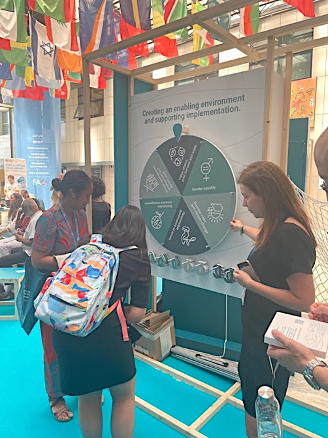 | A COFI exhibition was set up in FAO’s atrium with a dedicated corner for small-scale fisheries and to celebrater the 10th anniversary of the SSF Guidelines. The interactive exhibition aimed at raising awareness of the SSF Guidelines’ thematic chapters – by spinning awheel - and choosing related key implementation actions for the next decade, which visitors selected from cards shaped as aquatic foods to pin into a fishing net. The exhibition also presented a timeline of key milestones from the first 10 years of the SSF Guidelines and showcased photos from projects and activities related to their implementation. |
Big talks on small-scale fisheries
The exhibition also proposed a space for short presentations and interactions: the speaker’s corner. Small-scale fisheries were the focus of many sessions, see below:
| Special talk: Celebrating 10 Years of the SSF Guidelines: small-scale fishers' and indigenous peoples' solutions for advancing food sovereignty |
|---|
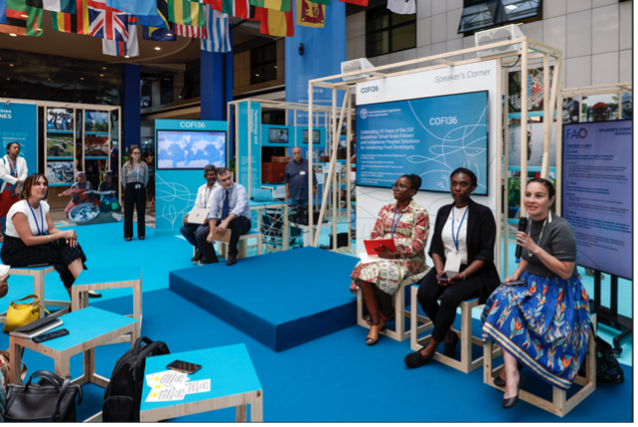 | This session celebrated the 10-year anniversary of the Voluntary Guidelines for Securing Sustainable Small-Scale Fisheries, providing a framework to advance the rights of small-scale fishers and Indigenous Peoples and sharing key insights from the 2nd SSF Summit. It aimed to guide States toward a sustainable food system that fulfills human rights obligations. Speakers Video from Michael Fakhry, UN Special Rapporteur for the Right to Food; Juan Echanove, FAO Right to Food lead; Rochelle Diver, International Indian Treaty Council (IITC); Nadine Nembhard, Caribbean Network of Fisherfolk Organisation (CNFO), Belize; Suman Kalian Mandal, East Coast Fisher Workers Union (ECFWU), India. |
|---|
| Inland fisheries in the broader landscape: a compelling case of the transformational potential of inland fisheries within integrated water resources management (IWRM) |
|---|
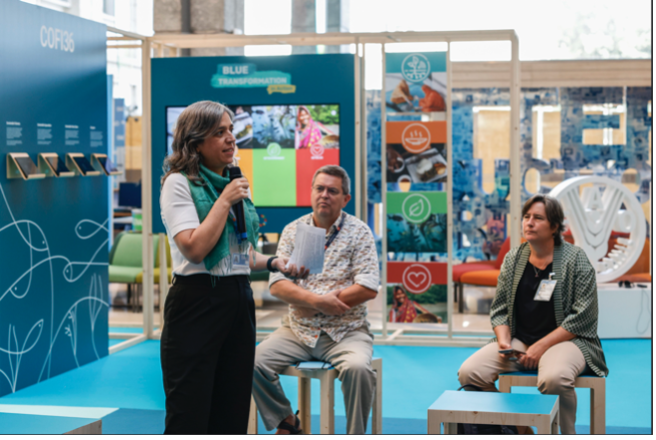 | This insightful session presented the connections between integrated water resources management (IWRM) and sustainable inland fisheries with a case study of Indonesia's application of the ecosystem approach to inland fisheries considering the broader basin ecosystem attributes. This example demonstrates IWRM's transformative impacts on inland fisheries ecosystems and their dependent fishing communities. Speakers Dr.Ir. Ridwan Mulyana, M.T, Director of Fisheries Resource Management, Ministry of Marine Affairs and Fisheries, Indonesia; Valerio Crespi, Fishery Officer, FAO; Angela Lentisco, Fishery and Aquaculture Officer, FAO-RAP. |
|---|
| Development of the National Plan of Action for Small Scale Fisheries: the Philippines experience of locally implementing the SSF Guidelines |
|---|
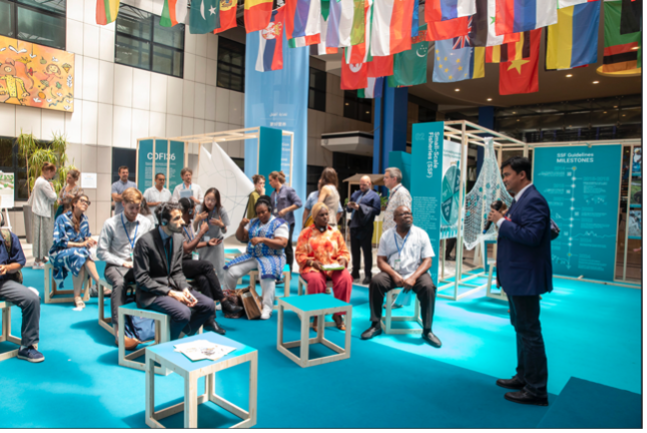 | This session proposed to share the dynamic approach leading to a strong participation of key SSF players to secure buy-in early on increasing likelihood of implementation of the NPOA SSF. The lessons learned and the major role of the institutionalized National Technical Working Group (NTWG) to supervise the development process was shared. Speakers Mr. Roy Ortega, OIC Fisheries Resources and Management Division, Bureau of Fisheries and Aquatic Resources, Philippines. |
|---|
| Small-scale fishing communities on the frontline of marine conservation |
|---|
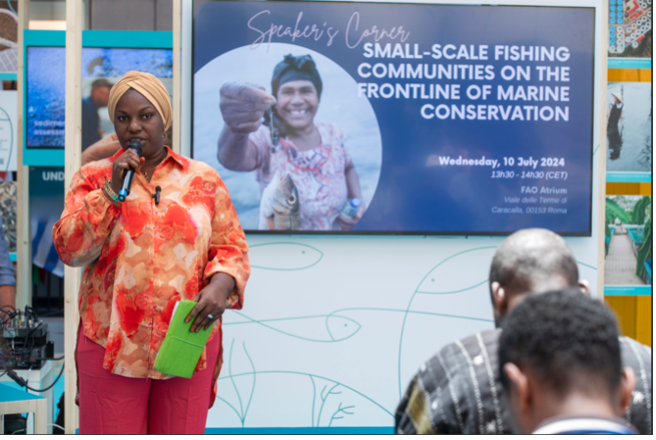 | For millenia, small-scale fishers have sustainably managed the natural resources they depend on. Their contributions to a healthy aquatic environment are deeply rooted in their culture, knowledge and practices. When it comes to looking at how to mainstream biodiversity in fisheries management, small-scale fishing communities and Indigenous Peoples deserve special consideration. Speakers Wifek Abdel Jawed, of the Development group for the fishing of Ghannouch, Tunisia and member of the WWF delegation; M. Gaoussou GUEYE, président de la CAOPA. |
|---|
| Collective action in Small-Scale Fisheries to achieve Zero Hunger (SDG 2) |
|---|
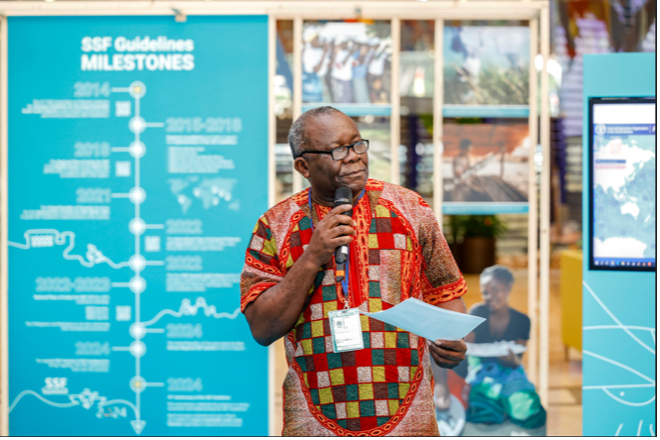 | Aquatic foods support millions of people and are key to achieving Zero Hunger. This conversation shared the significance of small-scale fisheries in global food security, and showcase how collective action can improve fisheries conditions, highlighting the role of community empowerment and participatory governance in achieving Zero Hunger. Speaker Felicito Núñez Bernardez, representative from the Garifuna Fishers of Honduras. |
|---|
| Towards fair and sustainable access arrangements for the benefit of coastal communities |
|---|
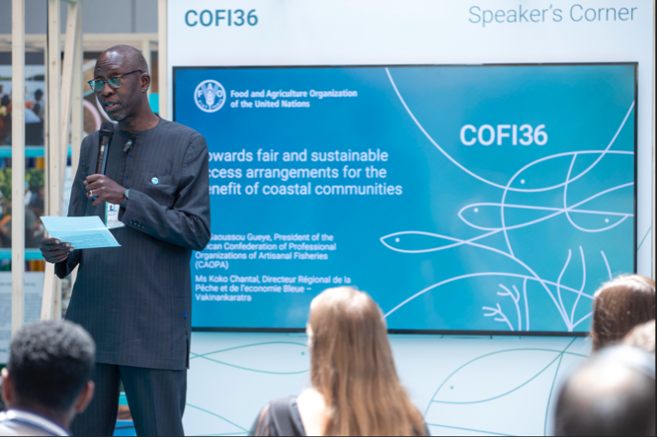 | In its annual resolution, the UNGA requests distant-water fishing nations to negotiate access arrangements with developing coastal States "on an equitable and sustainable basis and to take into account their legitimate expectation to fully benefit from the sustainable use of the natural resources of their exclusive economic zones." The proposed exchange explored the current practice and experience with access arrangements and discussed the conditions that will enable so-called 'resource holding countries' and in particular small scale fishers in the Global South to benefit from them. Speakers Mr Mahatante Tsimanaoraty Paubert, Madagascar Minister of Fisheries and Blue Economy; Mr Gaoussou Gueye, President of the African Confederation of Professional Organizations of Artisanal Fisheries (CAOPA). |
|---|
| Current status and priorities for transforming inland fisheries in aquatic landscapes |
|---|
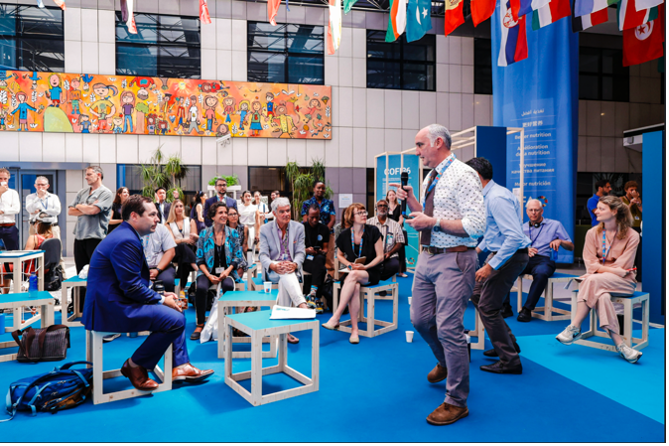 | A captivating session inspired by the forthcoming FAO fisheries circular on the state of the global inland fisheries. Discover the key facts, priorities and, most importantly, opportunities related to inland fisheries and their place in productive landscapes and livelihoods and be part of the conversation shaping their future. Speakers Robert Arthur, FAO International Inland Fisheries Specialist; Varun Tandon, FAO International Fisheries Consultant. |
|---|
| Social protection for Small-Scale Fisheries: protecting people, fish and food |
|---|
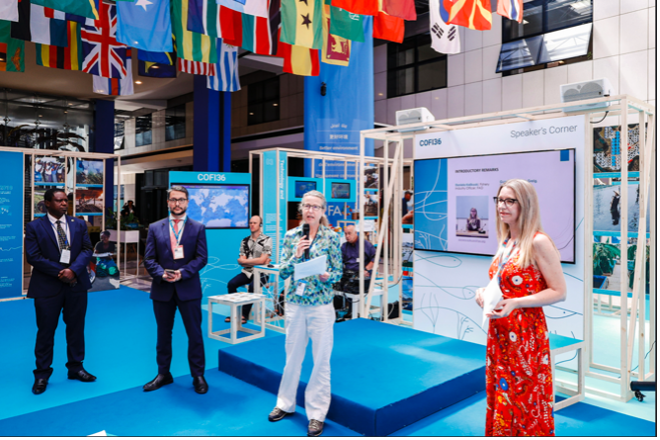 | The session proposed to explore how expanding social protection in the fisheries sector can mitigate economic shocks, climate-change impacts, and socio-economic disparities. It presented how countries are breaking barriers to ensure better coverage and adequacy for small-scale fishers and fish workers. Jointly organized by the FAO and WorldBank in collaboration with the government of Brazil and Kenya. Speakers Daniela Kalikoski, Fishery Industry Officer, FAO; Gunilla Tegelskär Greig, Social Protection & Jobs Global Practice, World Bank; Rodrick Kundu, Secretary, Fisheries & Blue Economy, State Department for Blue Economy & Fisheries, Ministry of Mining, Blue Economy & Maritime Affairs, Kenya; Ricardo Bacelette, Head Advisor for International Affairs, Ministry of Fisheries and Aquaculture of Brazil. |
|---|
| Implementation of the Small-Scale Fisheries Guidelines: a legal and policy scan |
|---|
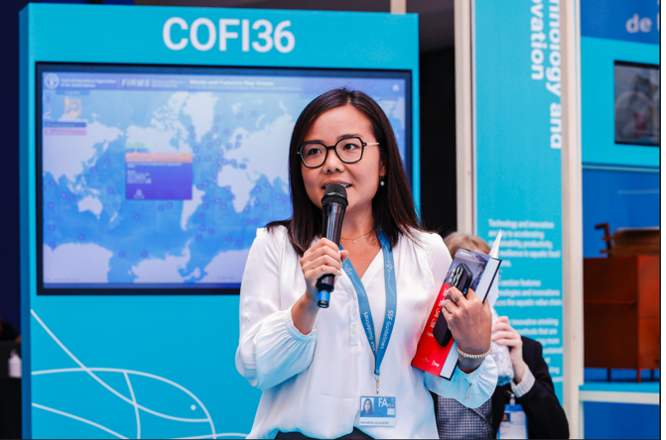 | This event officially launched the book “Implementation of the Small-Scale Fisheries Guidelines: A Legal and Policy Scan”, which provides a comprehensive assessment of multiple countries’ legal and policy frameworks vis-à-vis the SSF Guidelines. The Voluntary Guidelines for Securing Sustainable Small-Scale Fisheries in the Context of Food Security and Poverty Eradication (SSF Guidelines), adopted in 2014 by the FAO COFI, reaches its 10th anniversary this year. This marks a timely opportunity to share experiences and progress in the implementation of the SSF Guidelines, many of which can be facilitated through national legislation. Speakers Prof. Ratana Chuenpagdee, Memorial University of Newfoundland and TBTI Global; Dr. Julia Nakamura, Legal Officer, Development Law Service, FAO Legal Office; Prof. Svein Jentoft, The Norwegian College of Fishery Science, UiT The Arctic University of Norway. |
|---|
| Environmental stewardship by Small-Scale Fisheries - responsible fisheries and biodiversity conservation |
|---|
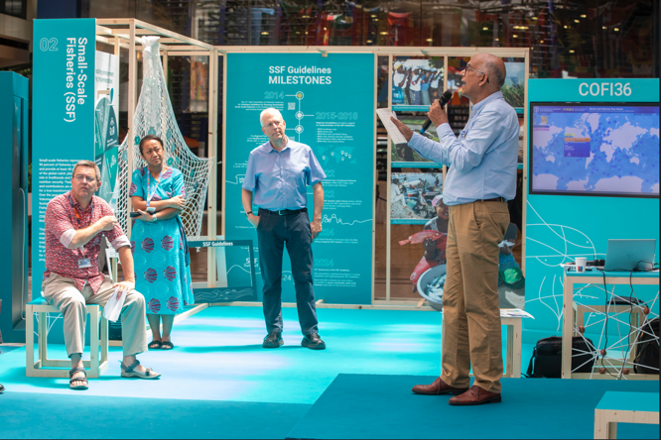 | Small-scale fisheries are on the frontlines of aquatic conservation. This reality is highlighted in the new FAO report "Environmental Stewardship by Small-Scale Fisheries" which provides support for implementing the Small-Scale Fisheries Guidelines and the Global Biodiversity Framework, as well as aiding effective fishery policy and sustainability of fishery livelihoods. Speakers Anthony (Tony) Charles, Member, Fisheries Expert Group of the IUCN Commission on Ecosystem Management and Professor, Saint Mary’s University.Sebastian Mathew, International Collective in Support of Fishworkers (ICSF) |
|---|

